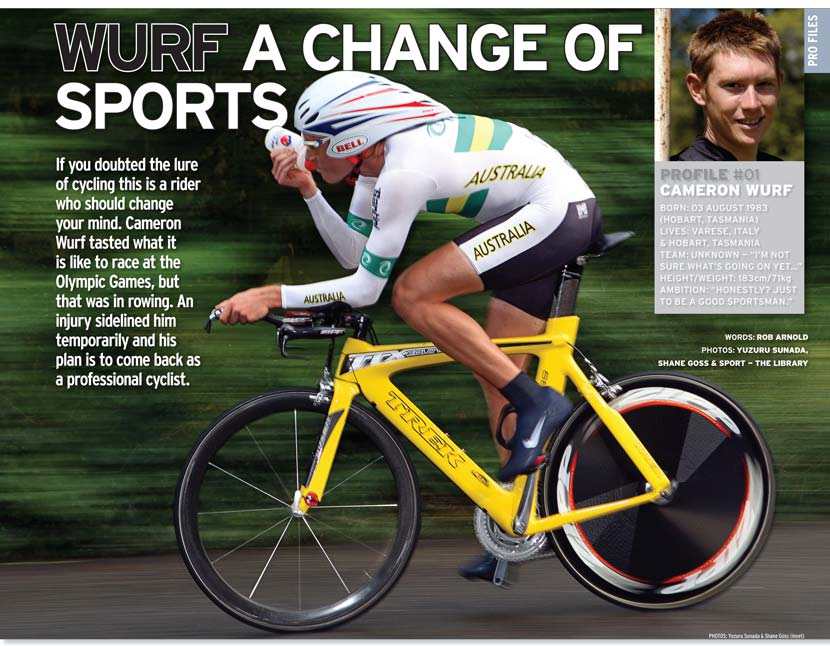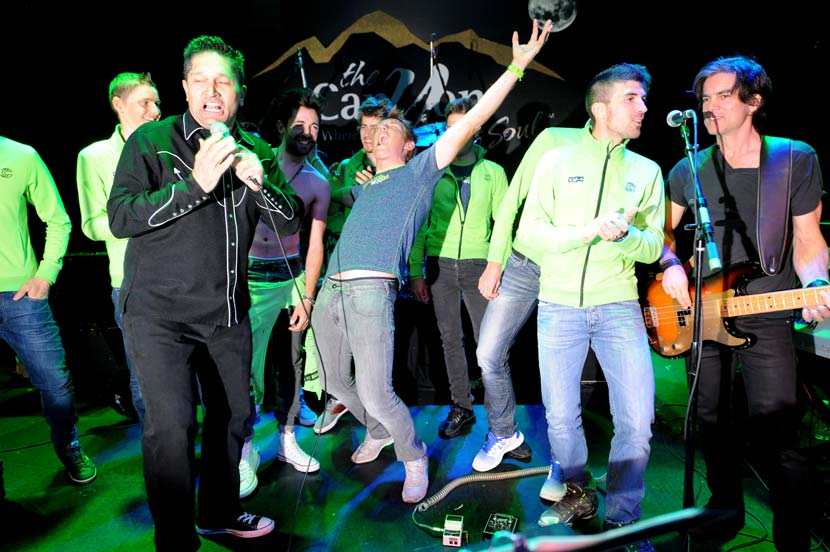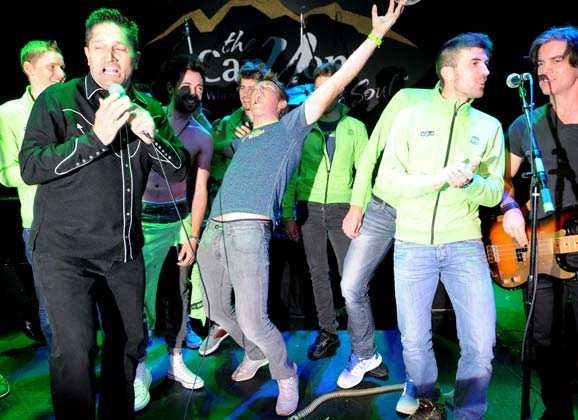[et_pb_section bb_built=”1″ admin_label=”section”][et_pb_row admin_label=”Row”][et_pb_column type=”1_4″][et_pb_text admin_label=”Text” background_layout=”light” text_orientation=”left” use_border_color=”off” border_color=”#ffffff” border_style=”solid”]
On 14 October 2017, Cameron Wurf set a record bike split for the Hawaii Ironman – 180km in 4:12:54…! He has written for RIDE in the past and we published this story about how he came to cycling, from rowing, around 10 years ago.
[/et_pb_text][/et_pb_column][et_pb_column type=”3_4″][et_pb_text admin_label=”Text” background_layout=”light” text_orientation=”left” use_border_color=”off” border_color=”#ffffff” border_style=”solid”]
When Cameron Wurf first raced the elite TT world championships (in 2007), he didn’t have a true professional contract. That would later come and the former rower would indeed be paid to race his bike. He was the only Australian on the Cannondale Pro Cycling team in 2014 but he has moved on to another sport now…
Back in RIDE #39 (volume 01 of 2008) we published our first profile on the charismatic man from Hobart.
In this Flashback we offer a reminder of where Wurf came from… and how it’s not always been about the bike for him.
* * * * *
[/et_pb_text][/et_pb_column][/et_pb_row][et_pb_row admin_label=”Row”][et_pb_column type=”4_4″][et_pb_text admin_label=”Text” background_layout=”light” text_orientation=”left” use_border_color=”off” border_color=”#ffffff” border_style=”solid”]

[/et_pb_text][/et_pb_column][/et_pb_row][et_pb_row admin_label=”Row”][et_pb_column type=”1_4″][et_pb_text admin_label=”Text” background_layout=”light” text_orientation=”left” use_border_color=”off” border_color=”#ffffff” border_style=”solid”]
This story was originally published in 2008.
[/et_pb_text][/et_pb_column][et_pb_column type=”3_4″][et_pb_text admin_label=”Text” background_layout=”light” text_orientation=”left” use_border_color=”off” border_color=”#ffffff” border_style=”solid”]
A change of sports…
(First published in January 2008)
– By Rob Arnold
If you doubted the lure of cycling this is a rider who should change your mind. Cameron Wurf tasted what it is like to race at the Olympic Games, but that was in rowing. An injury sidelined him temporarily and his plan is to come back as a professional cyclist.
“I’ve had nothing to do with any talent ID program,” said Cameron Wurf about how he came to be in the Australian cycling team at last year’s world championships in Stuttgart.
“I was rowing competitively and had an injury that prevented me from doing that.
“I had to give my wrists a chance to heal after some surgery and, rather than risk doing more damage by racing again too soon, I took a few months away from the boat with the aim of being 100 per cent perfect for Beijing.”
Wurf represented his country at the Athens Olympic Games as a rower during his first year in the senior ranks and admits that he expected success. Despite his natural talent, the level of competition caught him by surprise. He and George Jelbart didn’t make the final in the lightweight double scull.
“We just weren’t good enough,” confessed the confident 24-year-old from Hobart.
“We won gold in the under-23 category at the world championships the year before so we assumed we could front up at the Olympics and it would be fine.
“Rowing is a sport where the Olympics is the true pinnacle and everyone comes up a level and it is a different standard.
“Having not been before – and never even having competed at a major senior event – we hadn’t really learned to step up.”
Wurf wasn’t despondent, rather he accepted it as a lesson.
“We shouldn’t have been as outgunned as we were but other crews were certainly better prepared for it than we were.”
Less than a year after his enforced sojourn from rowing he was back in the green and gold colours but his boat had been replaced by a bike.
“Cameron is a rare talent and although he lacked experience his enthusiasm got him through the season,” said Richard England who raced with him at the US-registered Priority Health team during 2007.
“The Tour of Georgia was the first stage race he’d ever contested. Riding one of the biggest events in the States is not a bad way to start a pro career.”
Wurf finished 68th, two places ahead of 2006 US national series champion Karl Menzies. It wouldn’t be long before the former rower was winning bike races and putting his name on the selection list for [the 2007 world championships in] Stuttgart. But even he admits the progression was rapid.
“To be honest, I didn’t plan on doing anything that I did in 2007,” said Wurf at the end of the year.
“No idiot in their right mind would expect to be able to do the things that I was lucky enough to have been given the opportunity to do.
“I’d hoped to do a little bit of racing and initially I thought that would probably happen locally and I’d develop some skills and then look at next year to try and force myself onto the sport. It’s happened quite the opposite way.
“After the Tour of Georgia, I found myself in Europe racing in the amateur scene and then – thanks to a sequence of good results – I went to the worlds. When I got home I rocked up at the Jayco Herald-Sun Tour and I was being touted as someone who could contend for the title,” said the rider who finished ninth, 4:20 behind Matt Wilson. “It was all new to me.”
Wurf followed a course mapped out by Shayne Bannon and the Australian coach honoured his part in a bargain that was struck after he arrived at the AIS European base near Varese.
“I met him in Italy,” explained the recent convert about initial discussions with the pragmatic director of the national cycling program. “I told him about what I wanted to achieve. The first thing he told me was to get my head out of the clouds.
“I thought about it and realised he was right. I’d been a bit silly, it was unrealistic to think that I could ride at the worlds in my first year on the bike. He called me a couple of days later and in true Shayne style – very matter of fact and to the point – he explained that if I wanted to mix with the big boys, I had to prove myself.
“If I could ride and complete two stage races which he nominated and then race a time trial in France and win, then he’d let me ride the world championships.”
The opportunity to compete with the development team in Europe came about thanks largely to his result at the national championships last January. He finished fourth, a little over three minutes behind Nathan O’Neill. That was his first race.
By September he was winning. At the Chrono Champenois, the time trial nominated by Bannon, he was six seconds faster than his nearest rival and the final component of the challenge had been achieved.
“I’m proud I managed to win,” said Wurf. “I think it also gave him a bit of satisfaction because he had given me a clear guideline of what he wanted me to achieve. I pulled it off and it showed him I was committed to the sport.
“Some people may be thinking, ‘He’s arrived this quickly… how long is he going to stick around if it doesn’t work out?’ That’s not the case. I’ve always dreamed about cycling, it’s just been a matter of when I changed sports. I’m grateful to have been given the chance to perform.”
[/et_pb_text][/et_pb_column][/et_pb_row][et_pb_row admin_label=”Row”][et_pb_column type=”4_4″][et_pb_text admin_label=”Text” background_layout=”light” text_orientation=”left” use_border_color=”off” border_color=”#ffffff” border_style=”solid”]

[/et_pb_text][/et_pb_column][/et_pb_row][et_pb_row admin_label=”Row”][et_pb_column type=”1_4″][et_pb_text admin_label=”Text” background_layout=”light” text_orientation=”left” use_border_color=”off” border_color=”#ffffff” border_style=”solid”]
Cameron Wurf, centre stage, was a key member of Cannondale Pro Cycling in 2014. He belts out a tune with the boys at the pre-season training camp in California (above).
Photo: Brian Hodes
[/et_pb_text][/et_pb_column][et_pb_column type=”3_4″][et_pb_text admin_label=”Text” background_layout=”light” text_orientation=”left” use_border_color=”off” border_color=”#ffffff” border_style=”solid”]
The approach taken by Wurf is to attain set goals. But good fortune has also helped.
“I told myself I had to learn as much as I could from every event and not put too much pressure on myself. I wanted to enjoy my first year in the sport and I did!
“Having been lucky enough to do what I did, how could I not enjoy it? Next year I’m really keen to get stuck into it.
“Now I know enough about cycling and there are no excuses. I need to try and get some good results and I think I’ve got a good amount of improvement yet in me.”
* * * * *
There have been other former rowers to excel in cycling. The 1994 single scull junior world champion Amy Gillett also represented Australia in cycling, both on the track and road.
The physical attributes required for the sports are similar but Wurf believes psychology also plays a role in the adaptation process.
“I think the ability to deal with an element of fatigue and pain inflicted on yourself through physical activity is one thing rowers and cyclists have in common. You learn to be in a fair amount of pain and have to push through it because both sports demand a huge amount from your body,” said Wurf.
“That’s been one of the better things for the crossover, particularly when it comes to training. I don’t mind hurting myself for hours on end; I’ve been doing that for years already.
“The hardest thing to learn are the skills and tactics involved.
“In rowing you’ve got your own lane and no one can come near you.
“In cycling you can have a couple of hundred other blokes bumping into you.
“As long as you’re fit and healthy, you can do any sport you want if you put your mind to it.”
* * * * *
Data from physiological tests is used by sports scientists and coaches to determine what chance an athlete stands to succeed in sport. The numbers are similar for endurance events like rowing and road cycling. If it adds up to a positive package the necessary skills can be honed and that’s the position that Wurf finds himself in.
“I’m up there,” he said about the results of tests like VO2 max that have been conducted on him over the years.
“I come it at around 80ml per kilogram which is kind of the benchmark these days.
“Having said that, a good reading doesn’t guarantee that you’ll be good but it does give coaches something to start with. My threshold was high straight away and it’s going up a lot. I think it’s improved about five to 10 per cent this year which is good and hopefully it’s a pattern I’ll be able to maintain.
“I tested pretty well in the lab but I’m not naive, I know that is just one small part of the equation. If you don’t have a body that’s suited to sport, then you’re on the back foot.”
The decision to move to cycling was prompted by an injury but it’s something Wurf considered before he started rowing.
“I lived on Lord Howe Island between the ages of seven and 10. I used to ride my bike everywhere back then and I absolutely loved it. That was when I can remember watching the Tour de France and I always dreamed about doing that race.
“I always wanted to ride but Mum made me do rowing. I think she was more worried about me falling off and hurting myself – she thought the water was a bit safer for me.
“In the back of my mind I always knew I wanted to have a go at cycling yet I never really did a lot of it as an adult until last year. I might have done 10 or 20 rides a year. Half the time, when you’re rowing, you don’t have the opportunity to do any cycling because you’re flat out training with the oars.”
What about things like riding skills? Wurf knows he has a lot to learn but is there any need for his mum to be concerned?
“I haven’t had too many issues. I did a fair bit of motocross racing when I was young. I think that helps. Now I’m used to the speed and I’m reasonably comfortable in the bunch.
“One thing I did always try to do in rowing – a sport where you’re in a great deal of pain for the duration of the event – is relax. I’ve realised that this also helps on the bike.
“If you can keep calm, then the small gaps that you need to duck in and out of when you’re riding in a bunch seem to be a bit bigger than they appear to be when you’re tense.
“I try and control what I can and that is to keep the space around me as safe as I can. If someone else does something silly in front of me, there’s nothing I can do about that.”
* * * * *
Wurf’s experience serves as a good example for others who are interested in taking up cycling. It can be daunting to ride in a bunch for the first time.
“Talk to people,” is his response when asked what advice he’d offer other newcomers.
“What I really enjoy about cycling is that there are generally friendly people involved. I think there’s something about getting out in the fresh air and exercising that makes us feel good.
“Often the best way to learn is to observe what others around you are doing. An important thing is to talk to people and they’ll send you in the right direction. It’s a friendly sport and most people who do it seem to enjoy it.”
A big difference between rowing & cycling is the money earning potential but that’s not the driving force behind Wurf’s career move.
He has a degree in economics and enjoys trading shares, a hobby he shares with others from Bannon’s program including Simon Clarke and Wes Salzburger.
“For some people in cycling it’s their career and they’re driven by the fact that it’s all they’ve ever done. It’s how they’re going to make their living and set themselves up for the future.
“I come from a sport where you’re encouraged to work and go to university as well. There’s not a lot of money in rowing. There’s enough to help you continue to focus on your training, but it’s not like you can retire on the profits.
“My motivation for cycling is not about money. If I wanted to earn a comfortable salary, I’d use my degree and get a job.
“I want to achieve the same things that I did in rowing. I want to represent my country and if that’s helping others like Cadel or Michael to win a gold medal at the Olympics or possibly having a crack at one for myself one day, those are my goals in sport. I’m not driven by the commercial aspect of it so much, rather the challenge of doing my best.
“It’s good that I don’t have to stress about it being the only thing in my life. I’ve got other things to keep me going.”
Something else Wurf has to adapt to is that, in road cycling, the Olympic events are just one feature in a packed calendar. And, unlike rowing, a gold medal is far from being the only major prize.
How does he believe he’ll cope with the challenge of tapering for several events per year versus one every four years? “It’s different but I think I’ll get used to it.
“Once you’ve been to an Olympics it’s different. It’s easy in rowing to motivate yourself for four-year cycles. One season you could focus on endurance and you might not go as fast as what you might otherwise have. The next season you could hone in on getting power up. And by the Olympics you put it all together and start to see some results.
“In rowing it’s rare for the same people to win all through the Olympiad. You’ll find that the people who win the Games may be around the mark during the Olympiad but they won’t be winning all the time.
In road cycling it’s possible to peak every year for something and get a result. No one would focus on the Olympics for a four-year period in cycling because there is so much prestigious stuff on in between.”
– Rob Arnold
[/et_pb_text][/et_pb_column][/et_pb_row][/et_pb_section]



